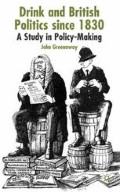Abstract
Governments had been concerned about the dangers of intoxicants as far back as Tudor times. The link to public disorder or crime was the main issue. Hence, the very first reference in England to liquor licensing came in a statute of 1494 that dealt with the problem of ‘vagabonds’ and gave the justices of the peace power to ‘reject and put away common ale selling’ where they deemed necessary.1 From time to time, moralists also waxed lyrical about the effects of overindulgence among the masses. This was especially marked in the celebrated ‘gin mania’ in London in the eighteenth century, so vividly satirised and illustrated by Hogarth. However, there had been no systematic policy or attitude towards alcohol or its abuse. Indeed, the gin problem had been the unintended result of the landed interest in Parliament desiring to dispose of a glut of corn and to raise money for a war with France.2 By the early nineteenth century, however, the issue of the excess consumption of alcohol began to be defined as a social problem, one of intemperance or excessive drinking.
Access this chapter
Tax calculation will be finalised at checkout
Purchases are for personal use only
Preview
Unable to display preview. Download preview PDF.
Notes
11 Hen. vii, c.2; C. M. Iles, ‘Early Stages of Public House Regulation’, Economic Journal, 12 (1903), pp. 251–62.
Andrew Barr, Drink: a Social History ( London: Pimilico, 1998 ) p. 9.
James S. Roberts, Drink, Temperance and the Working Class in Nineteenth-Century Germany ( London: Allen and Unwin, 1984 ) p. 2.
F. Engels, The Condition of the Working Class in England, W. O. Henderson and W. H. Chaloner (eds) (Oxford: Blackwell, 1958 ) pp. 116, 141–3.
G. B. Wilson, Alcohol and the Nation: a Contribution to the Study of the Liquor Problem in the United Kingdom from 1800 to 1935 ( London: Nicholas and Watson, 1940 ) p. 335.
Brian Harrison, Drink and the Victorians: The Temperance Question in England 1815–1872 ( London: Faber and Faber, 1971 ) pp. 40–1.
Martin J. Wiener, Reconstructing the Criminal: Culture, Law, and Policy in England, 1830–1914 (Cambridge University Press, 1990 ) p. 11.
Cobden to Joseph Livesey, 10 October, 1849, quoted Henry Carter, The English Temperance Movement: a Study in Objectives ( London: Epworth, 1933 ) p. 12.
Province of Canterbury, Report by the Committee on Intemperance for the Lower House of Convocation ( London: Longman, 1869 ) p. 3; Reports from the Select Committee of the House of Lords… into the prevalence of the habits of intemperance… PP, 1878–9, (113), x.
Ibid., 251, col. 475, (5 March, 1880). Cf: ‘after the ladies had left the dinner-table he… confessed himself somewhat indulgent to that occasional excess in social drink which is wholly due to social feeling and temptation. He cited the opinion of some great employer of labour not unfavourable to the character of occasional drunkards.’ F. E. Hamer (ed.), Personal Papers of Lord Rendel (London: Benn, 1931) p. 54. Cf.
Roy Jenkins, Gladstone (London: Macmillan, 1996, Papermac edn) p. 417.
J. S. Mill, On Liberty, ed. R. B. McCallum ( Oxford: Blackwell, 1946 ) p. 73.
Temperance Record, 4 March, 1871, p. 49. See also Joseph Livesey, Free and Friendly Remarks upon the Permissive Bill, Temperance Legislation and the Alliance (Preston 1862);
Joseph Livesey, True Temperance Teaching: showing the errors of the Alliance and the Permissive Bill ( London: Tweedie, 1873 );
Joseph Livesey, True Policy Vindicated: a friendly Correspondence between Joseph Livesy and Mr T. H. Barker… (Manchester: UKA [1870]).
Oliver MacDonagh, Early Victorian Government 1830–1870 ( London: Weidenfeld and Nicolson, 1977 ).
H. J. Leech (ed.), The Public Letters of the Right Hon John Bright, MP ( London: Sampson Low, 1885 ) p. 172.
Charles Dickens, Sketches by Boz, ch. 22 (Illustrated Library edn, London, Chapman and Hall: 1874 ) pp. 215–16.
Harrison, Drink, pp. 387–405; Brian Harrison, ‘Two Roads to Social Reform, Francis Place and the “Drunken Committee” of 1834’, Historical Journal, 11, (1968), pp. 272–300.
T. R. Gourvish and R. G. Wilson, The British Brewing Industry, 1830–1980 (Cambridge University Press, 1994 ) p. 5.
Sidney and Beatrice Webb, The History of Liquor Licensing in England, principally from 1700 to 1830 ( London, Longman: 1903 ) p. 114.
James Kneale, ‘The Place of Drink: Temperance and the Public, 1856–1914’, Social and Cultural Geography, 2, no. 1, (2001), p. 47.
Dawson Burns, What the Alliance is and what it is not (Manchester UKA: [c.18541) p. 5.
Brian Harrison, ‘The Sunday Closing Riots of 1855’, Historical Journal, 8 (1966), pp. 23–65.
Harrison, Drink, pp. 198–9; John Prest, Liberty and Locality: Parliament, Permissive Legislation, and Ratepayers’ Democracies in the Mid-Nineteenth Century (Oxford University Press, 1990).
National Temperance League, The Temperance Congress of 1862, ( London: W. Tweedie, 1862 ); Proceedings of the International Temperance and Prohibition Convention (London, 1862).
Norman R. Longmate, The Waterdrinkers: a History of Temperance ( London: Hamilton, 1968 ), pp. 144–57; Harrison, Drink, pp. 212–14.
Author information
Authors and Affiliations
Copyright information
© 2003 John Greenaway
About this chapter
Cite this chapter
Greenaway, J. (2003). The Drink Problem in Early Victorian Britain, 1830–70. In: Drink and British Politics since 1830. Palgrave Macmillan, London. https://doi.org/10.1057/9780230510364_2
Download citation
DOI: https://doi.org/10.1057/9780230510364_2
Publisher Name: Palgrave Macmillan, London
Print ISBN: 978-1-349-42329-3
Online ISBN: 978-0-230-51036-4
eBook Packages: Palgrave History CollectionHistory (R0)

